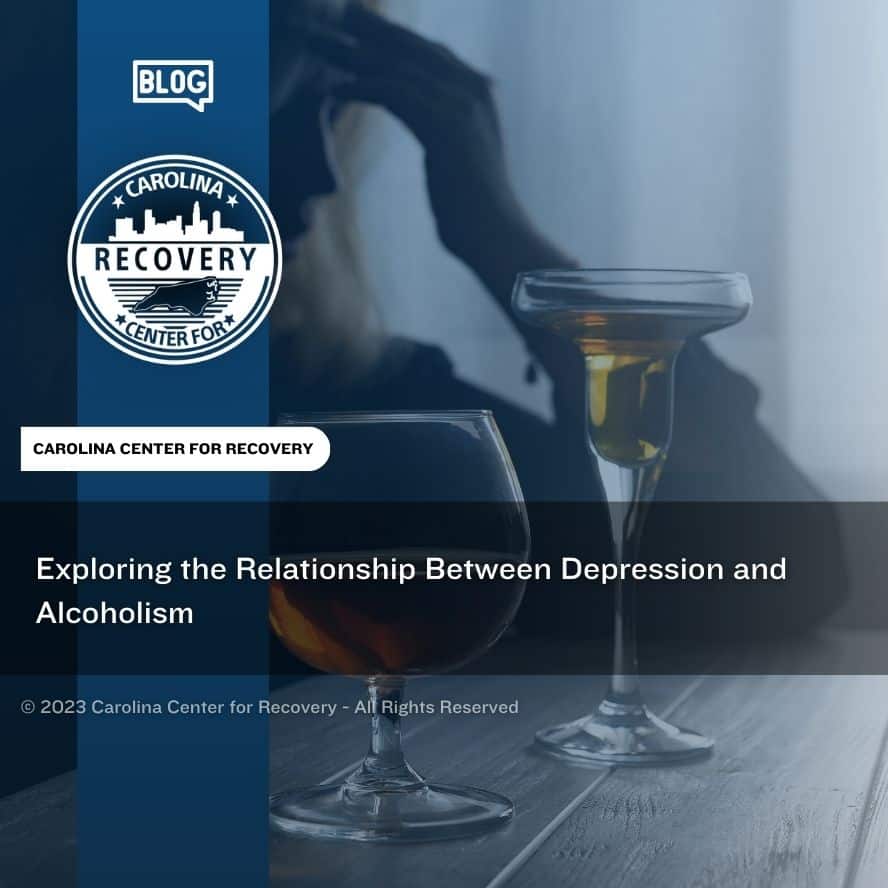Exploring the Relationship Between Depression and Alcoholism

Medically Verified: 2/1/24
Medical Reviewer
Chief Editor

All of the information on this page has been reviewed and verified by a certified addiction professional.
Alcohol is the most commonly abused substance in the United States, with nearly 80% of people over the age of 12 reporting drinking at some point in their lifetime.[1]
While occasional alcohol use is fine, some individuals have a hard time controlling how much they drink. This can quickly turn into an alcohol use disorder, causing alcohol to become the number one priority in your life.
According to the National Institute of Alcohol Abuse and Alcoholism (NIAAA), 29.5 million people struggled with alcoholism in 2021.[2]
Oftentimes, people who have an alcohol use disorder often struggle with mental health conditions like depression. When exploring the relationship between alcohol and depression, it’s important to understand that depression can either come first or be caused by long-term alcohol abuse.
Exploring Co-Occurring Alcohol and Depression
According to the National Library of Medicine (NLM), 63.8% of people with alcoholism also suffer from depression.[3] When you have both alcohol and depression at the same time, this is known as having co-occurring disorders.
But how are these conditions related? Why is the prevalence of depression among people with alcohol use disorders so high?
Let’s take a look at the two different ways co-occurring depression and alcoholism can develop.
How Does Depression Lead to Alcoholism?
It is not uncommon for people suffering from untreated depression to turn to alcohol to cope. Drinking alcohol can temporarily numb your emotions by depressing the central nervous system. When someone with depression realizes this, they begin craving that emotional numbness to cope with the symptoms they face daily. As a result, their alcohol intake increases and remains consistent. Eventually, this causes them to become addicted to alcohol, leading to co-occurring depression and alcoholism.
How Does Alcohol Abuse Cause Depression?
Another way that these conditions are linked is that consistent abuse of alcohol can cause feelings of depression. Alcohol has significant impacts on mental and emotional health. Since alcohol use lowers your inhibition, feelings of stress and anxiety may be relieved while your confidence increases.
However, when you are not drinking alcohol, your body is not used to the absence of the extra chemicals that are controlling your anxiety and making you feel higher self-esteem. As a result, you might feel depressed after you stop drinking.
Signs You Need Dual Diagnosis Treatment for Depression and Alcohol Use Disorder
If you believe that you have both alcoholism and depression, it’s important to be aware of the signs. Knowing the symptoms of these conditions can help you determine whether it’s time to seek treatment. Thankfully, dual-diagnosis rehab centers like Carolina Center for Recovery can offer you treatment for depression and alcoholism simultaneously.
Symptoms of Depression
Depression is a mental health condition that can cause low mood, feelings of hopelessness, shame, guilt, and even suicidal thoughts or self-harming behaviors.
The common symptoms of depression include:[4]
- Persistent feelings of sadness, anxiousness, or emptiness
- Feelings of hopelessness or a pessimistic outlook
- Frequent irritability, frustration, or restlessness
- Feeling guilty, worthless, or helpless
- Losing interest in previously enjoyed activities
- Decreased energy, fatigue, and feeling slowed down
- Having a hard time concentrating and remembering things
- Trouble sleeping or sleeping too much
- Changes in appetite and weight
- Physical aches, pains, headaches, or digestive issues that do not have a clear physical cause
- Thoughts of death, self-harm, or suicide attempts
Signs of Alcoholism
Alcoholism is a condition that causes you to become unable to control your alcohol intake, experience uncontrollable cravings to use alcohol, and deal with uncomfortable and possibly dangerous withdrawal symptoms when you cannot drink.
The symptoms of an alcohol use disorder include:[5]
- Drinking more or longer than you intended to
- Wanting to cut down or completely stop your drinking but being unsuccessful
- Spending a lot of time drinking or recovering from the effects of alcohol
- Experiencing uncontrollable urges or cravings to use alcohol
- Drinking often interferes with your responsibilities at home, school, or work
- You continue to drink despite experiencing interpersonal relationship issues
- Losing interest in previously enjoyed activities so you have more time to drink
- Getting into risky situations while drinking, such as driving while under the influence
- Continuing to drink even though alcohol is causing physical or mental health issues
- Needing to increase the amount of alcohol you drink to experience the desired effect
- Experiencing withdrawal symptoms when the effects of alcohol begin to wear off
Finding Help for Co-Occurring Alcoholism and Depression
If you or a loved one suffers from alcoholism and depression, it’s time to seek help. Dual-diagnosis treatment centers like the Carolina Center for Recovery can provide you with the mental health and addiction treatment you need to live a happy, healthy, and fulfilled life.
To learn more about our treatment programs for depression and alcoholism, please contact us today.
References:
- The National Institute of Alcohol Abuse and Alcoholism (NIAAA): Alcohol Use in the United States, Retrieved November 2023 From https://www.niaaa.nih.gov/alcohols-effects-health/alcohol-topics/alcohol-facts-and-statistics/alcohol-use-united-states-age-groups-and-demographic-characteristics
- The National Institute of Alcohol Abuse and Alcoholism (NIAAA): Alcohol Use Disorder in the United States, Retrieved November 2023 From https://www.niaaa.nih.gov/alcohols-effects-health/alcohol-topics/alcohol-facts-and-statistics/alcohol-use-disorder-aud-united-states-age-groups-and-demographic-characteristics
- The National Library of Medicine (NLM): The Association between Alcohol Dependence and Depression before and after Treatment for Alcohol Dependence, Retrieved November 2023 From https://www.ncbi.nlm.nih.gov/pmc/articles/PMC3658562/
- The National Institute of Mental Health (NIMH): Depression, Retrieved November 2023 From https://www.nimh.nih.gov/health/topics/depression

